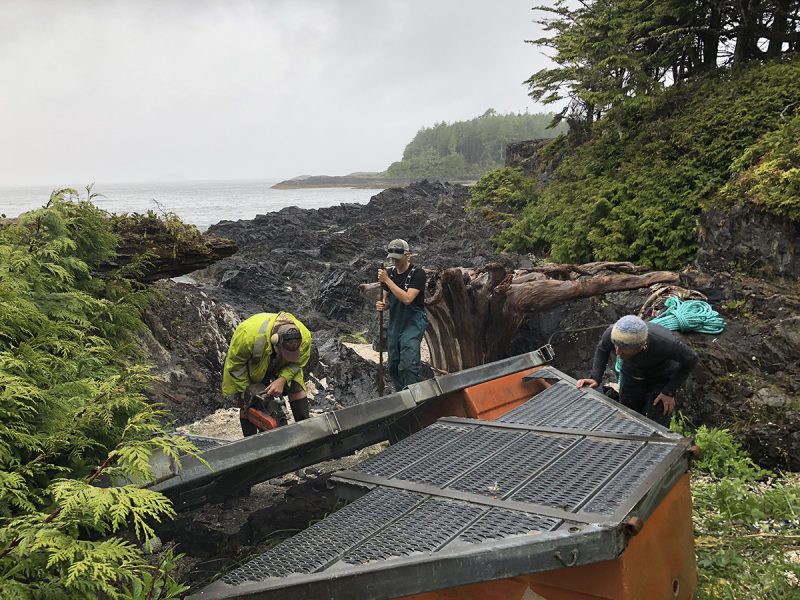Aquaculture industry moves to tackle plastic pollution in oceans
First aquaculture certification scheme to include specific plastics requirements in the works
By Fabian Dawson
SeaWestNews
The contribution of plastic debris from global aquaculture is not at the same magnitude as that from capture fisheries, but more needs to be done to stop plastic waste from mariculture farms ending up in the ocean, states a new white paper.
Released, as representatives of the worlds’ governments meet in Spain at the United Nations Climate Change Conference (COP25), the white paper by the Aquaculture Stewardship Council (ASC), for the first time classified the different causes of plastic waste from aquaculture and assessed the risks to different farming systems.
While most of the attention surrounding plastic pollution in the seas has revolved around abandoned, lost, and discarded or ghost fishing gear, there is not enough understanding on the plastics issue as it relates to aquaculture, states the ASC white paper – “Marine Litter and Aquaculture Gear.”
It has determined that extreme weather is currently one of the major causes of plastic ‘ghost gear’ from fish farms entering oceans and rivers, and warns that the increasing “frequency and severity” of tropical storms due to climate change could exacerbate the problem.
“The issue of ghost gear from fisheries is well known, but there has been much less analysis of the impact of fish farms,” said Marcelo Hidalgo, Standards Coordinator for ASC.
“ASC plans to be the first aquaculture certification scheme to include specific plastics requirements, and as a science-based organisation it was important for us to make sure they are evidence-based.”
The white paper finds that while lost plastics from aquaculture and capture fisheries are often considered together, this is a not a helpful approach as the causes are often quite different.
The study which looked at more than 60 ASC-certified farms found that the most likely causes of plastic loss from aquaculture sites were extreme weather, poor waste management, and installation wear, and failure resulting from poor siting or lack of maintenance.
The Aquaculture Stewardship Council (ASC) is an independent, international non-profit organisation that manages the world’s leading certification and labelling programme for responsible aquaculture.
In British Columbia, as of August 2019, 37 salmon farms are certified to the ASC sustainability standards.
To achieve certification under the ASC Salmon Standard, farms are audited against 500 separate aspects of the site’s performance. It is considered to be the gold standard in environmental and social certification.
“We’re really proud that we were able to use information from ASC certified farms to help produce this important paper, and we hope it can help improve standards across the entire industry,” said Hidalgo.
The new white paper recommends what it calls the five R’s for aquaculture producers looking to reduce plastic waste:
Reduce: this includes reducing plastic abrasion or equipment failure by using the most appropriate materials, and reducing the risks from unforeseen events by developing stringent risk assessments and contingency plans;
Re-use: the paper suggests that cheap single-use equipment can be both environmentally and economically more expensive than higher-specification alternatives – for example using reusable gloves rather than single-use latex gloves;
Recycle: for example, engaging with equipment suppliers to ensure as much recycled material as possible is used;
Recover: this can include simple operations such as regular litter collection as well as more advanced procedures, such as the use of tracking devices on key equipment that is at risk of being lost;
Refuse: where possible, the paper recommends avoiding the use of equipment that is difficult to recycle, for example mixed-plastics materials.
Last September, two British Columbia businesses were given grants from Fisheries and Oceans Canada (DFO) for their innovative solutions to minimise plastic pollution by recycling fishing and aquaculture equipment.
This was part of Ottawa’s $8.3 million to help fish harvesters, environmental groups, Indigenous communities, and the aquaculture industry retrieve abandoned fishing gear, or so-called ghost gear, from the ocean and dispose of it responsibly.
Chloe Dubois, Chief Executive Officer of Ocean Legacy Technologies Ltd, the technology branch of the Ocean Legacy Foundation, said each year, more than eight million metric tons of plastic end up in the world’s oceans.
“Currently, options for collection and recycling of marine gear have been very limited, often leading to the long term yard storage or landfill disposal of these items,” she said, after receiving a grant of $150,000 towards the development of proof-of concept for a marine plastics processing facility.
“Ocean Legacy has had great response from businesses, government, First Nations communities, non-profits and industry leaders to continue growing a formal program to better manage fishing and aquaculture gear at end-of-life.
“This innovation could be a game changer for our coastal communities by increasing our local plastic processing capacities to manage marine debris and industrial marine plastic materials currently entering landfill and our ocean ecosystem upon their end-of-life,” she said.
Image courtesy of Cermaq showing its employees removing debris at one of the company’s shore clean up initiatives

